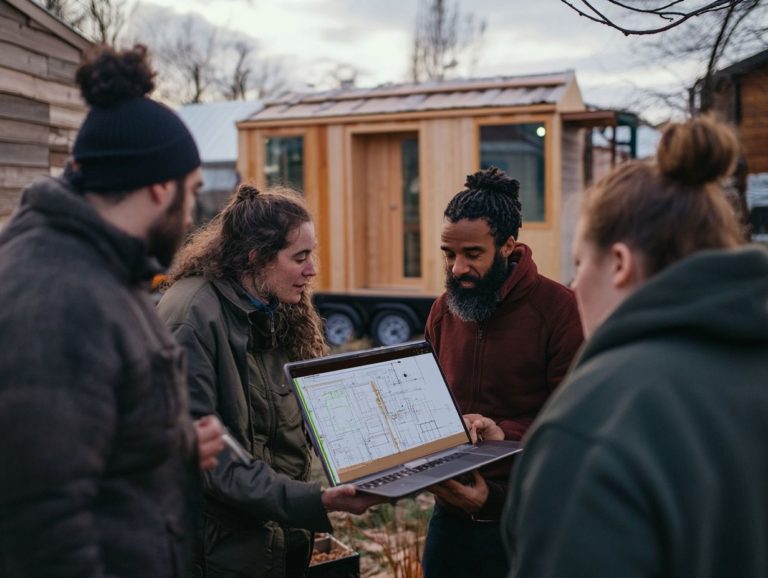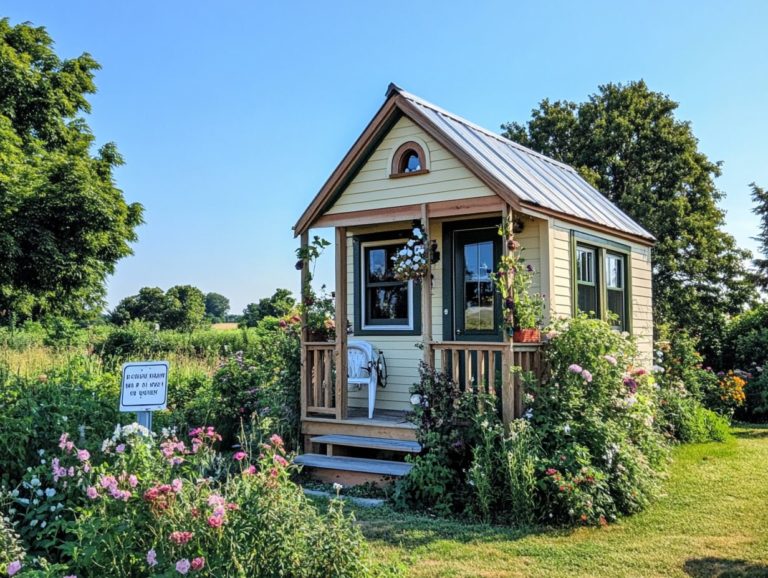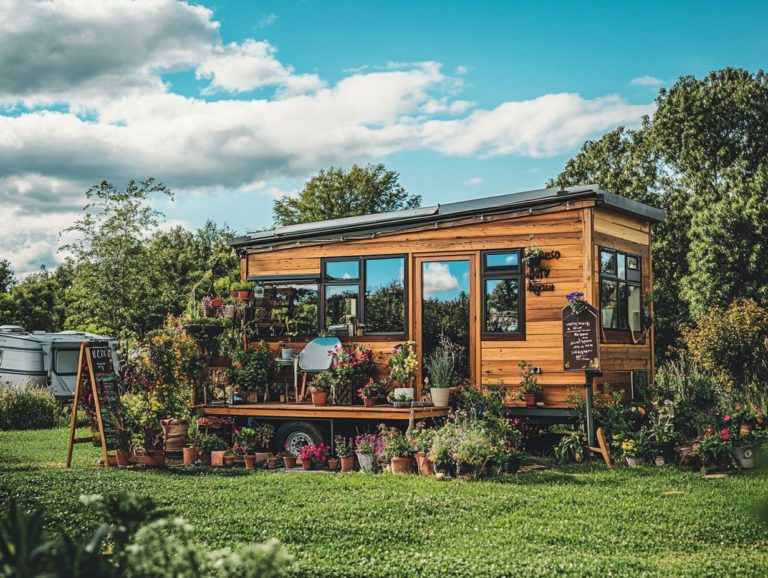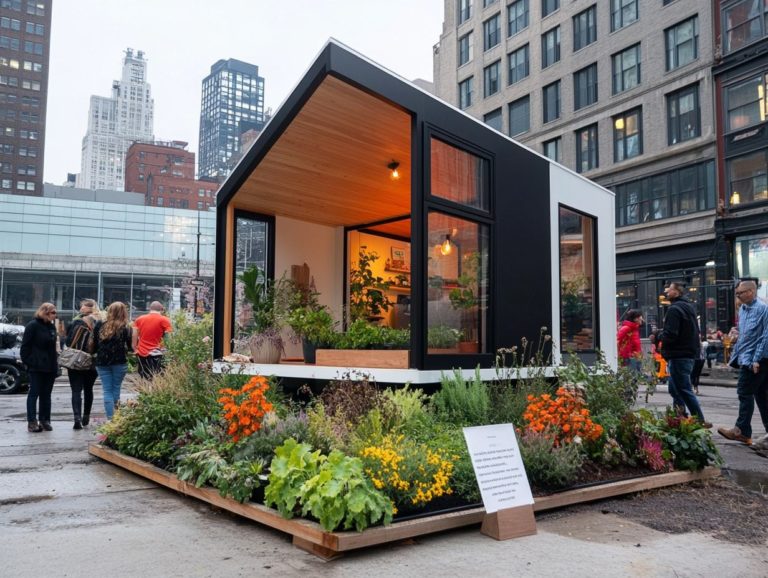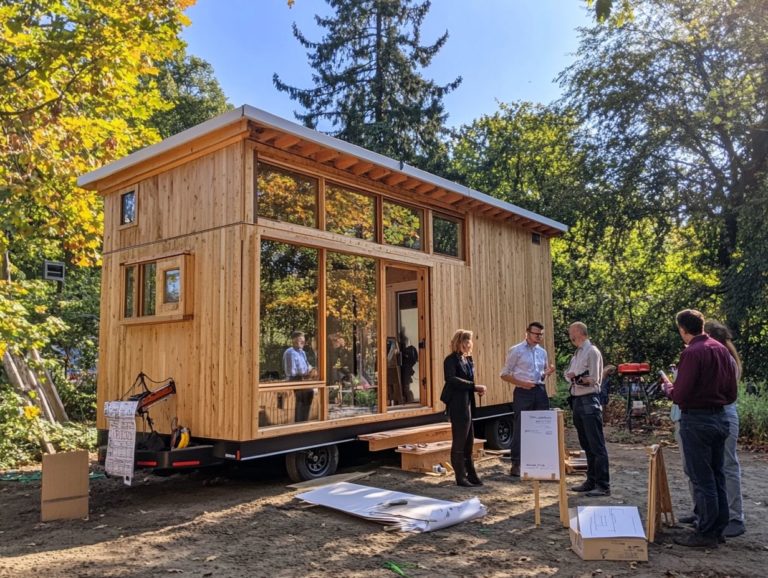Common Legal Mistakes in Tiny House Projects
Tiny houses are captivating the imagination of many as the epitome of sustainable and minimalist living.
However, navigating the legal issues surrounding tiny house projects can be quite a challenge. This guide will break down essential legal considerations, such as zoning regulations and building codes, the building process, and common pitfalls to avoid.
You’ll discover practical tips for ensuring compliance while crafting a tiny home that s not only legally sound but also uniquely yours. Turn your tiny house dreams into reality without the burden of legal headaches, especially in the context of California laws.
Contents [hide]
- Key Takeaways:
- Legal Considerations for Tiny House Projects
- Common Legal Mistakes to Avoid
- Tips for Avoiding Legal Issues
- Frequently Asked Questions
- What are common legal mistakes to avoid when working on a tiny house project, especially regarding building materials and living space?
- Do I need to obtain building permits for my tiny house project?
- What are the consequences for not following building and zoning codes?
- Can I legally live in a tiny house on my property?
- Do I need to register my tiny house as a permanent residence?
- What steps can I take to avoid legal issues with my tiny house project?
Key Takeaways:
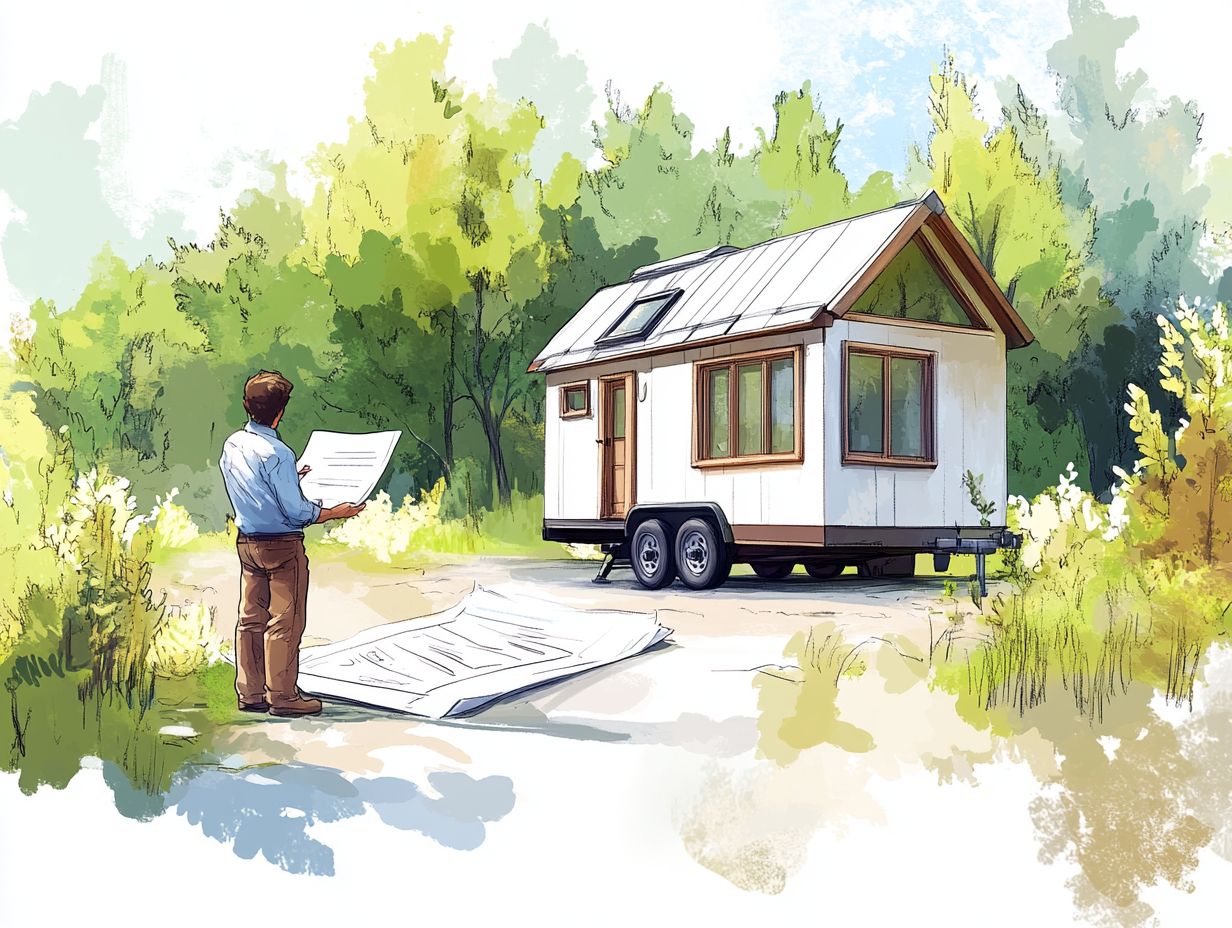
- Not researching local laws can lead to costly legal issues in tiny house projects, especially related to local ordinances.
- Obtaining necessary permits and following building codes is crucial for a successful tiny house project.
- Consulting with a lawyer and working with local officials can help avoid common legal mistakes in tiny house projects.
What are Tiny Houses?
Tiny houses, often called tiny homes, are compact living spaces that embrace the principles of minimal living and the tiny house movement. They re designed for affordable housing solutions and sustainable living.
Typically ranging from 100 to 400 square feet, these innovative structures cater to those looking to downsize and simplify their lives while adopting eco-friendly practices.
By focusing on efficiency and thoughtful design, tiny homes offer the appeal of lower living costs and cultivate a strong sense of community among residents. Advocates champion the philosophy of minimalism, urging occupants to value experiences over material possessions.
The designs can vary widely, from sleek modern aesthetics to charming rustic cabins, ensuring there s something for every taste while maintaining functionality.
Initiatives like THIMBY work to weave tiny houses into existing neighborhoods, helping tackle the housing crisis and provide housing alternatives. This approach nurtures community development, offers a sustainable answer to urban overcrowding, and strengthens social bonds through shared living experiences.
Legal Considerations for Tiny House Projects
When you embark on tiny house projects, understanding the legal considerations is important. Numerous legal issues tied to building codes, zoning regulations, and local ordinances can significantly influence the feasibility and legality of these affordable housing solutions.
Understanding these laws is crucial for ensuring compliance with California laws and meeting the housing standards set forth by local government entities.
Zoning and Building Codes
Zoning and building codes are critical in the tiny house movement, as they dictate where and how you can construct your dream home, ensuring compliance with the International Residential Code and local ordinances.
Navigating these regulations is essential to successfully maneuver through the intricate regulatory environment surrounding tiny house projects.
Zoning laws determine where you can place your tiny house, distinguishing between residential, commercial, and mixed-use spaces. Some municipalities offer specific zones tailored for tiny house communities that champion sustainable living.
Conversely, building codes focus on construction elements, such as structural integrity and safety standards. In certain regions, tiny houses on wheels may not receive recognition as legitimate homes, which can present additional hurdles.
Specific ordinances, like those in Portland, Oregon, mandate minimum square footage and require setbacks from property lines, significantly shaping community designs. Therefore, becoming well-versed in both zoning and building codes can be invaluable in transforming your tiny house aspirations into reality, especially when you understand the legal pitfalls of tiny house building.
Permitting Process
The permitting process for tiny house construction can be intricate, often entailing a maze of legal considerations. You must navigate local government regulations and secure the necessary approvals for your building materials and designs. Each locality has its unique housing policies that influence how tiny homes are permitted.
Understanding these complexities is vital for anyone looking to build their compact dwelling. Acquiring permits typically involves zoning approvals, building permits, and sometimes special variances if your project strays from standard codes. Additionally, creating a tiny house lease can help clarify legal essentials for your new home.
As a tiny house enthusiast, you may face challenges like restricted lot sizes and residential zoning laws that dictate where tiny homes can be placed. You might also encounter neighborhood issues or objections from neighbors based on community standards.
By staying informed about local laws, you can smooth your permitting journey and effectively overcome challenges, turning your dream of tiny living into a fulfilling reality.
Common Legal Mistakes to Avoid
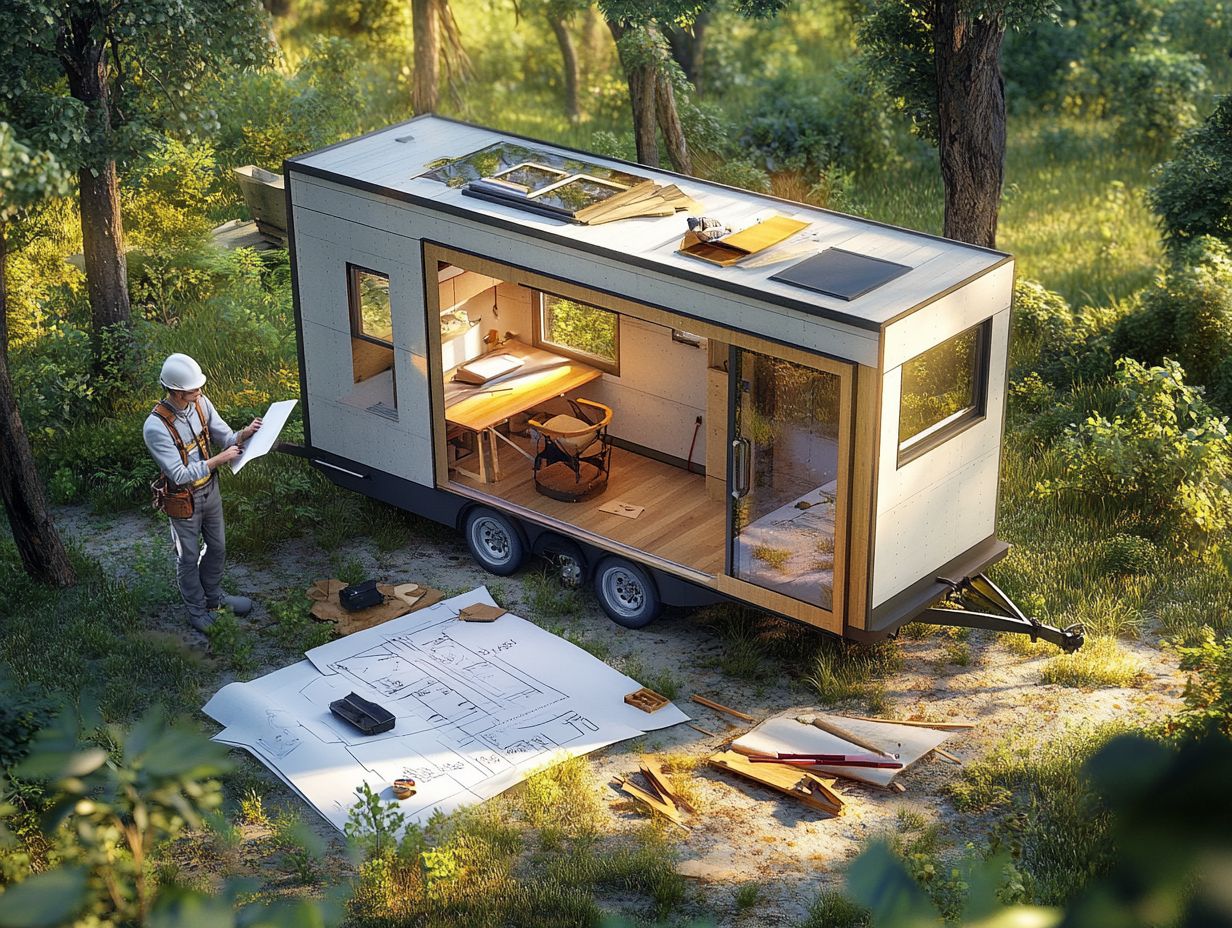
Navigating the legal landscape of tiny homes presents unique challenges. Overlooking common legal pitfalls can derail even the most meticulously planned projects and impact housing affordability.
Failing to research local laws, neglecting necessary permits, or ignoring building codes can lead to significant setbacks or legal troubles. These issues can affect home ownership.
It s crucial for tiny house builders to exercise diligence in their preparations to ensure a smooth and successful endeavor.
Not Researching Local Laws
One of the most critical missteps is failing to research local laws regarding tiny houses. This oversight can lead to unexpected complications that derail your dreams of a tiny house. Understanding zoning regulations and local ordinances is essential for success!
Each locality has a unique set of rules governing residential living. These regulations can influence where to place your tiny house and how it must be constructed. Overlooking these rules can result in fines or forced relocations. To navigate these complexities, it’s essential to understand tiny house living legal myths that may impact your choices.
To navigate this landscape, leverage resources like local government websites, neighborhood land-use plans, and community boards discussing zoning issues. Engaging in online forums can provide insights, while consulting local builders can help you understand any legal jargon. Additionally, familiarizing yourself with the legal aspects of tiny house off-grid living can save you from headaches down the road.
Not Obtaining Necessary Permits
Failing to obtain necessary permits can lead to serious legal issues and might halt your tiny house dreams. It s crucial to grasp the permitting process and understand your area’s specific requirements.
Different localities may require specific permits, including zoning permits, building permits, and possibly environmental permits. Overlooking these can lead to hefty fines, frustrating delays, or even dismantling your structure. It’s also important to understand the legal aspects of your living situation, such as tiny house living and legal liability.
By taking a proactive stance on the permitting process, you can avoid these pitfalls and gain insights into local building practices and community standards. This approach fosters a positive relationship with local authorities, setting the stage for your successful tiny house project. Additionally, understanding the legalities of moving a tiny house is crucial to ensure compliance and avoid potential issues.
Not Following Building Codes
Neglecting to adhere to building codes can lead you into a maze of legal troubles, including fines and forced alterations that could derail your tiny house project. It’s essential to follow the standards set by the International Residential Code to ensure safety and compliance.
Understanding these codes protects you as the builder and enhances the well-being of future occupants. Regulations regarding insulation, electrical wiring, and plumbing are critical in tiny homes due to limited space and unique design challenges. Additionally, being aware of the legal implications of tiny house ownership is essential. Ignoring these codes can create dangerous situations, such as electrical fires or plumbing leaks that jeopardize your home’s structural integrity.
Overlooking building codes can also lead to higher insurance costs and complications when selling the property. Ensuring compliance safeguards your investment and cultivates a safer living environment for everyone involved.
Tips for Avoiding Legal Issues
To avoid legal issues during your tiny house project, adopt proactive strategies. Consult a lawyer, work with local officials, and stay informed about changes in housing policies to reduce risks related to legal compliance.
Taking these steps helps you navigate the regulatory landscape surrounding tiny homes with confidence.
Consulting with a Lawyer
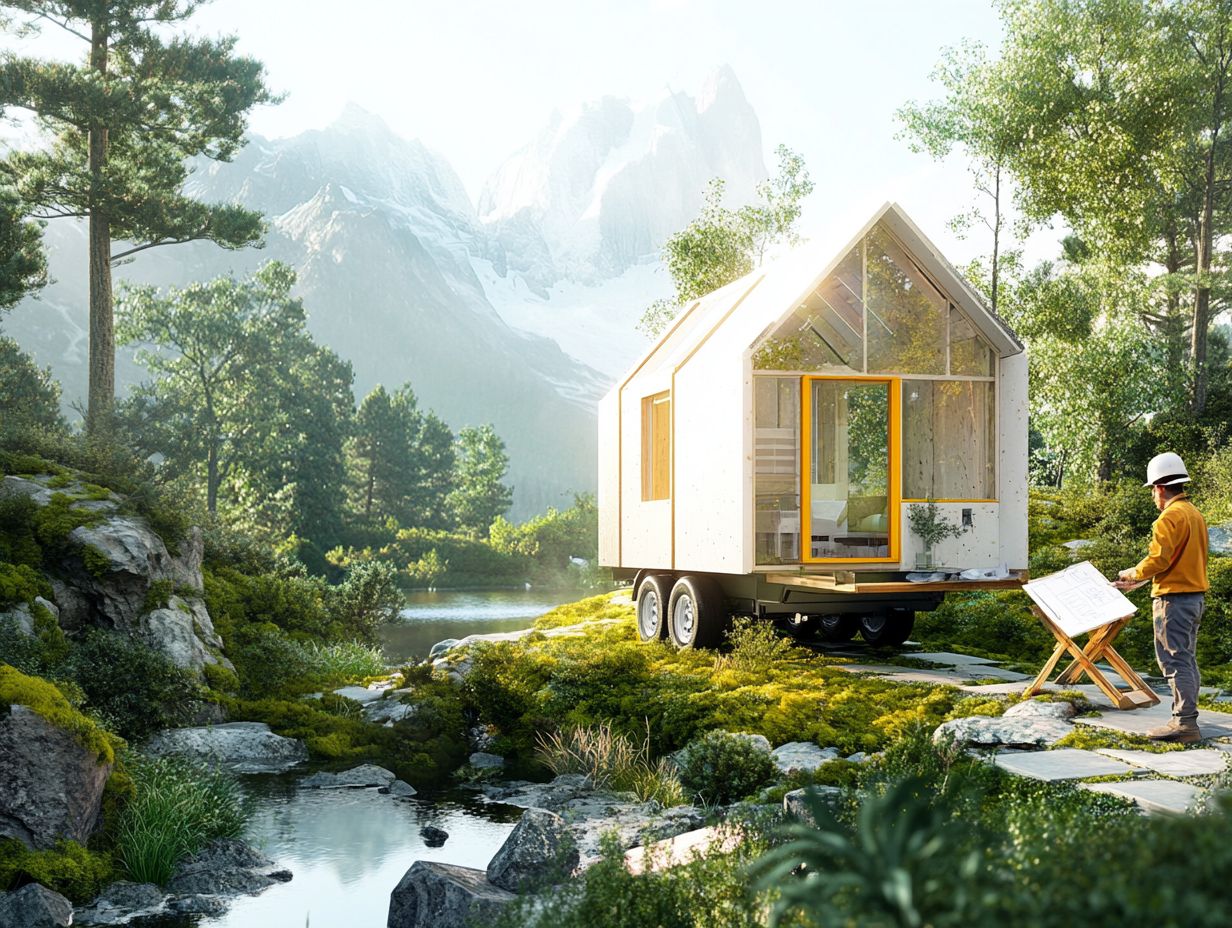
Consulting with a lawyer who specializes in real estate regulations, especially California laws, is essential for you as a tiny house builder. Expert guidance ensures compliance with all applicable laws and helps you avoid potential legal issues. Their insights clarify complex tiny home regulations.
Navigating zoning laws, building codes, and permit requirements can feel overwhelming, particularly concerning local ordinances. Legal consultation provides insights to understand local regulations and align your projects with community standards. Additionally, it’s important to be aware of tiny house legal challenges and how to overcome them.
If you’re a tiny house developer, you may face unique challenges when placing a structure on a residential lot. Some areas impose restrictions on minimum dwelling sizes or have specific zoning classifications. In such cases, understanding the legal risks of building a tiny house and seeking an attorney’s advice simplifies these hurdles, paving a smoother, compliant path to building.
In disputes over permit denials, having knowledgeable legal representation can greatly enhance your chances of a favorable outcome, saving you time, money, and stress.
Working with Local Officials
Building a collaborative relationship with local officials is key to navigating zoning regulations and understanding housing policies affecting tiny house projects. Engaging with these officials provides valuable insights into community development and local requirements.
Participating in local meetings and forums fosters open communication, allowing for the exchange of ideas and concerns. Approach these conversations with clear objectives while remaining open to feedback. Establishing partnerships with officials leads to a tailored approach to zoning laws that impact tiny houses.
With local insights, you ensure compliance and identify potential community support, paving the way for smoother project execution and better neighborhood relations.
Staying Informed on Changes in Laws
Staying informed about changes in laws and housing policies is crucial for tiny house builders. This awareness helps you preempt legal issues and ensure compliance.
Regularly reviewing updates will assist you in adapting to new regulations and community guidelines. Stay ahead of the game! Subscribe to newsletters that deliver important updates straight to your inbox.
Joining community groups, whether online or offline, cultivates a sense of camaraderie. It also offers a platform for discussing local practices, housing standards, and compliance strategies.
Attending local meetings unlocks valuable networking opportunities. You ll gain first-hand knowledge from experienced peers. By remaining proactive and well-informed, you not only protect your investment but also strengthen a community that can navigate ongoing legal changes.
Frequently Asked Questions
What are common legal mistakes to avoid when working on a tiny house project, especially regarding building materials and living space?
Some common legal mistakes to avoid include not obtaining proper building permits and not following building and zoning codes. Also, ensure you properly register the tiny house as a permanent residence.
Do I need to obtain building permits for my tiny house project?
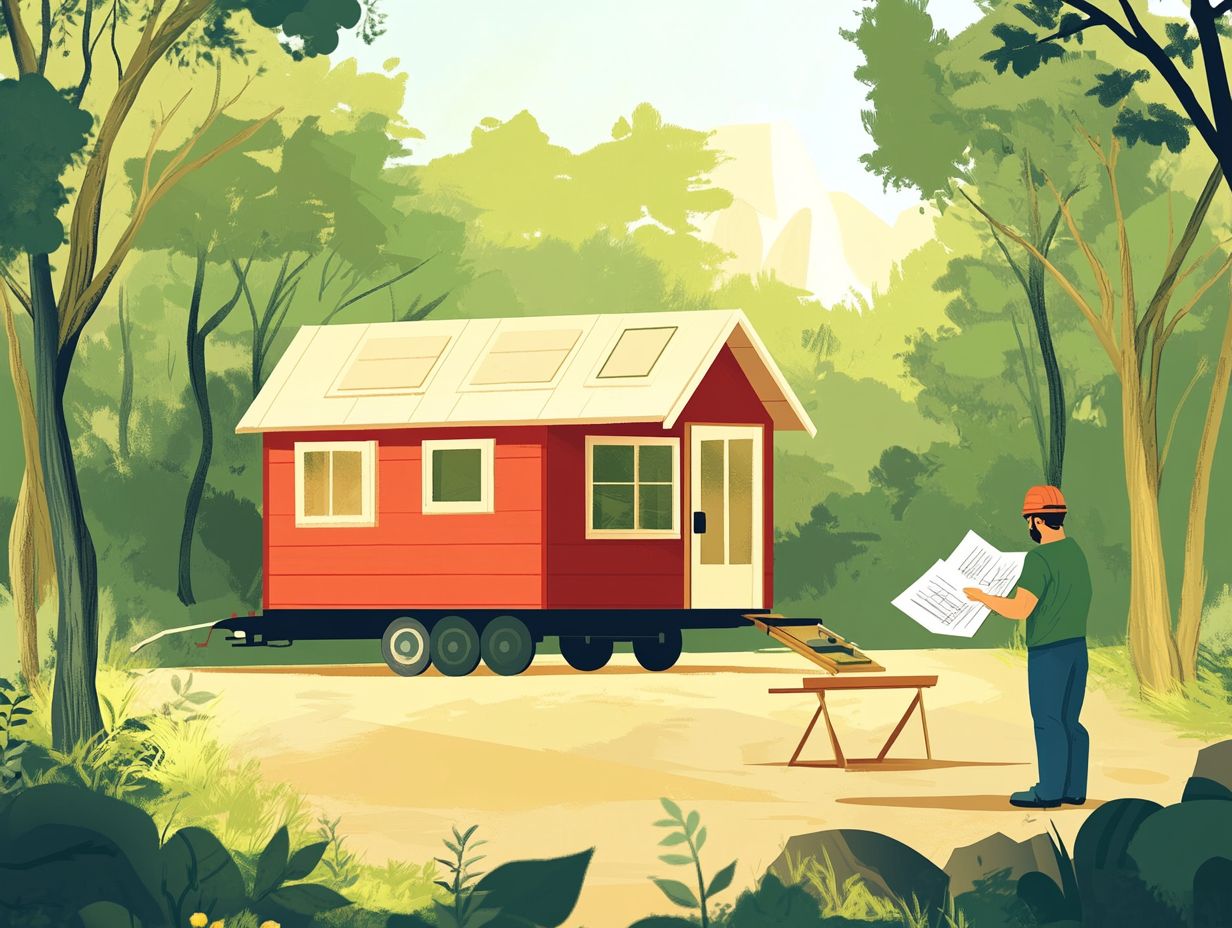
Yes, it is important to obtain building permits for your tiny house project. This ensures that your project meets all safety and building standards set by the local government.
Failure to obtain permits can result in fines and legal consequences.
What are the consequences for not following building and zoning codes?
Not following building and zoning codes can lead to fines and legal penalties. In severe cases, you may even have to tear down your tiny house project.
Research and understand all applicable codes before beginning your project.
Can I legally live in a tiny house on my property?
The legality of living in a tiny house on your property varies by location and local zoning laws. Research these laws now to ensure you can legally live in a tiny house on your property!
Do I need to register my tiny house as a permanent residence?
In most cases, yes, you will need to register your tiny house as a permanent residence, especially to qualify for home ownership and comply with California laws.
This is necessary for obtaining certain utilities and services, such as water and electricity. Check with your local government for specific registration requirements.
What steps can I take to avoid legal issues with my tiny house project?
To avoid legal issues, thoroughly research and understand all applicable building and zoning codes. Obtain proper permits and register the tiny house as a permanent residence if necessary.
It may also be wise to consult with a lawyer who is knowledgeable about tiny house regulations.

